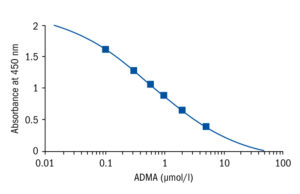ADMA ELISA, High Sensitivity
The vascular endothelium plays a central role in the regulation of vascular structure and function, mainly due to the formation of endothelium-derived nitric oxide (NO). NO is formed by the enzyme NO synthetase (NOS) from the amino acid precursor L-arginine. NOS activity can be downregulated by ADMA, an endogenous inhibitor of NOS. Elevated ADMA levels in plasma have been found in clinical studies including patients with hypercholesterolemia, hypertension, chronic heart failure, chronic renal failure and other internal disorders. ADMA may have diagnostic relevance as a novel cardiovascular risk marker.
Research topic
Blood pressure regulation and NO metabolism, Cardiovascular disease
Type
Competitive ELISA, Immobilized antigen
Applications
Serum, Plasma-EDTA, Plasma-Heparin, Cell culture medium
Sample Requirements
5–20 µl/well
Storage/Expiration
Store the complete kit at 2–8°C. Under these conditions, the kit is stable until the expiration date (see the label on the box).
Calibration Curve

Limit of Detection
0.01 µmol/l
– Antoniades C, Tousoulis D, Marinou K, Vasiliadou C, Tentolouris C, Bouras G, Pitsavos C, Stefanadis C. Asymmetrical dimethylarginine regulates endothelial function in methionine-induced but not in chronic homocystinemia in humans: effect of oxidative stress and proinflammatory cytokines. Am J Clin Nutr. 2006 Oct;84 (4):781-8
– Charitidou C, Farmakiotis D, Zournatzi V, Pidonia I, Pegiou T, Karamanis N, Hatzistilianou M, Katsikis I, Panidis D. The administration of estrogens, combined with anti-androgens, has beneficial effects on the hormonal features and asymmetric dimethyl-arginine levels, in women with the polycystic ovary syndrome. Atherosclerosis. 2008 Feb;196 (2):958-65
– Horowitz JD, Heresztyn T. An overview of plasma concentrations of asymmetric dimethylarginine (ADMA) in health and disease and in clinical studies: methodological considerations. J Chromatogr B Analyt Technol . 2007 May 15;851 (1-2):42-50
– Iribarren C, Husson G, Sydow K, Wang BY, Sidney S, Cooke JP. Asymmetric dimethyl-arginine and coronary artery calcification in young adults entering middle age: the CARDIA Study. Eur J Cardiovasc Prev Rehabil. 2007 Apr;14 (2):222-9
– Konishi H, Sydow K, Cooke JP. Dimethylarginine dimethylaminohydrolase promotes endothelial repair after vascular injury. J Am Coll Cardiol. 2007 Mar 13;49 (10):1099-105
– Korish AA, Arafah MM. Catechin combined with vitamins C and E ameliorates insulin resistance (IR) and atherosclerotic changes in aged rats with chronic renal failure (CRF). Arch Gerontol Geriatr. 2008 Jan-Feb;46 (1):25-39
– Krempl TK, Maas R, Sydow K, Meinertz T, Boger RH, Kahler J. Elevation of asymmetric dimethylarginine in patients with unstable angina and recurrent cardiovascular events. Eur Heart J. 2005 Sep;26 (18):1846-51 – Melikian N, Wheatcroft SB, Ogah OS, Murphy C, Chowienczyk PJ, Wierzbicki AS, Sanders TA, Jiang B, Duncan ER, Shah AM, Kearney MT. Asymmetric dimethylarginine and reduced nitric oxide bioavailability in young Black African men. Hypertension. 2007 Apr;49 (4):873-7
– O’Dwyer MJ, Dempsey F, Crowley V, Kelleher DP, McManus R, Ryan T. Septic shock is correlated with asymmetrical dimethyl arginine levels, which may be influenced by a polymorphism in the dimethylarginine dimethylaminohydrolase II gene: a prospective observational study. Crit Care. 2006;10 (5):R139
– Schnabel R, Blankenberg S, Lubos E, Lackner KJ, Rupprecht HJ, Espinola-Klein C, Jachmann N, Post F, Peetz D, Bickel C, Cambien F, Tiret L, Munzel T. Asymmetric dimethylarginine and the risk of cardiovascular events and death in patients with coronary artery disease: results from the AtheroGene Study. Circ Res. 2005 Sep 2;97 (5):e53-9
– Schulze F, Maas R, Freese R, Schwedhelm E, Silberhorn E, Boger RH. Determination of a reference value for N(G), N(G)-dimethyl-L-arginine in 500 subjects. Eur J Clin Invest. 2005 Oct;35 (10):622-6
– Schulze F, Wesemann R, Schwedhelm E, Sydow K, Albsmeier J, Cooke JP, Boger RH. Determination of asymmetric dimethylarginine (ADMA) using a novel ELISA assay. Clin Chem Lab Med. 2004;42 (12):1377-83
– Wanby P, Nilsson I, Brudin L, Nyhammar I, Gustafsson I, Carlsson M. Increased plasma levels of asymmetric dimethylarginine in patients with carotid stenosis: no evidence for the role of the common FABP2 A54T gene polymorphism. Acta Neurol Scand. 2007 Feb;115 (2):90-6
– Wang TD, Chen WJ, Cheng WC, Lin JW, Chen MF, Lee YT. Relation of improvement in endothelium-dependent flow-mediated vasodilation after rosiglitazone to changes in asymmetric dimethylarginine, endothelin-1, and C-reactive protein in nondiabetic patients with the metabolic syndrome. Am J Cardiol. 2006 Oct 15;98 (8):1057-62

